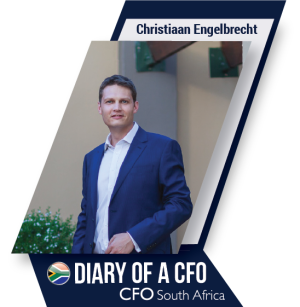In November 2016, Christiaan Engelbrecht joined Ster-Kinekor as CFO, a highlight in a finance career that started at Deloitte and Vodacom. He keeps a monthly diary for CFO.co.za to share his trials, tribulations and triumphs. This is part 2: time management.
I am sitting through a lecture on time management again! Shall we forget that I decided to attend to reach CPD targets and let's not recognise that it is starting to feel like a complete waste of time? (pun intended)! How to use this time effectively? What is time? How has time changed through my career? Do I have enough time as CFO and if not, how can I create more time? Suddenly I have a renewed energy - here are a few questions we can explore!
- Work smarter, not harder | 20 & 21 September 2017 | REGISTER HERE
- Diary of a CFO part 1: the first 90 days
Do you recall being a trainee accountant working tirelessly to get the job done? As a first year, I thought I was working at top speeds, only to realise in the following years that snails learn to speak Latin faster. Third year trainees are introduced to the concept of "it will only take 5 minutes", which is actually anything between 2 hours and a day for the person doing the work! As I moved with my career, it really felt as though time was against me! I was often confronted with too much to do and too little time.
This was one of my biggest fears transitioning into the executive:
Will I have enough time to do everything I need to do?
Albert Einstein revolutionised the way we engage with space, time and gravity when he published his work on general relativity in 1916. Einstein suggested the further away two objects are from each other, the weaker the gravity between these objects and the slower time passes relative to each other. By example, if you climb a mountain to the top you are further away from the core of the earth, thus lower gravity and the slower time passes in relation to someone at the foot of the mountain.
Many years later this was proven to be correct! Two atomic clocks were in sync at the start of the experiment. One clock was elevated to the top of a mountain and the other clock remained at the sea level. 48 hours later they were reunited and scientist noticed that the clocks were not in sync anymore. The clock sent to the top of the mountain was behind the clock at the foot; time slowed down!
Should one attempt to apply this piece of physics to the corporate structure, it would suggest that in theory one would have more time at the top of the organisation than at the bottom. What a strange concept? It actually felt the exact opposite! It felt as though one has less and less and less time the higher one climbs to the top of the corporate ladder.
I sat in the lecture and smiled with amusement as I tried to connect Einstein's theory of general relativity with my fear of not having enough time as a CFO to accomplish my goals. Then it dawned on me: they are connected after all!
At the executive level, all the time spent by everyone in the organisation rolls up as the time resource you have to accomplish the set goals. Whatever you gravitate towards will be the space in which you spend most time. By ensuring the space you are working in ONLY consists of the strategic goals and those burning and significant issues one actually can slow down time!
This is underpinned by letting go of the need to control every operational process and determine the functioning of internal controls. I am not understating the importance of these, however the focus on these should be the duty of the CFO's management team. That will be there space, they will gravitate towards it and that's where they will spend their time.
As with every good theory, this application of Einstein's general theory of relativity on the corporate structures had to be tested! Directly after the lecture ended I started to focus on only the strategic goals and burning issues. The trust I put in my management team to take full responsibility for all the processes and controls paid off! I was not rushed anymore and felt much more in control. I suddenly had open space around me. I had time to think properly before making decisions, review more deeply and with greater insight and could interact commercially and operationally with much greater ease. It felt as though I created time!
I appreciate that "focussing on what is important and the rest will fall in place" is probably a well-known fact. Steven Covey elegantly formulated this as "First things first" in his book: Seven Habits of highly effective people. What actually fascinated me most of this entire mental gymnastics and the subsequent grounding into everyday life is the potential that one could find ways to apply all scientific discoveries to the business environment. To explore the probability that emotional intelligence, physics, corporate and even biology are somehow interconnected in ways yet to be discovered. Now there is something worth thinking about!











